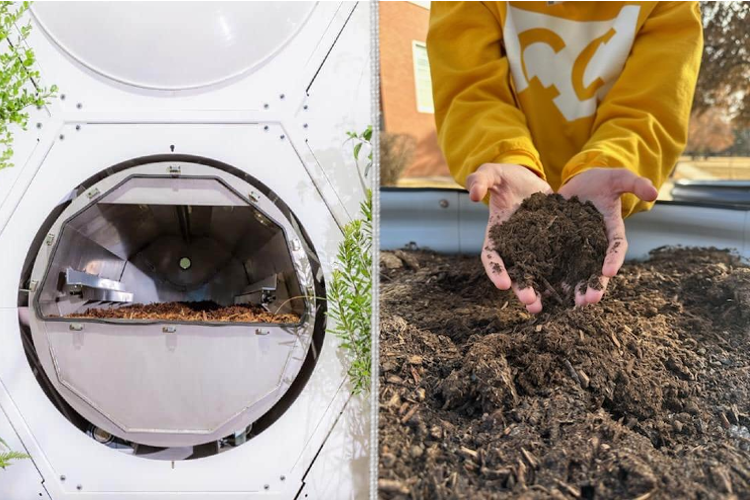
Through a controlled process, human bodies can be broken down into nutrient-rich fertilizer, which is often used to encourage plant growth. photos courtesy of Recompose, Ravi Apte
Human composting may provide an organic method of body disposal that could benefit not only humanity, but entire ecosystems.
On December 31, 2022, the state of New York approved the process of human composting, also called natural organic reduction, after a brief legal battle. Human composting is typically defined as the disposing of human remains by naturally breaking them down into fertile material. Typically, a body is placed into an airtight container along with bundles of alfalfa, straw, and wood chippings, which creates a dank environment where microbes thrive. Under these conditions, a body can decompose within a mere ten weeks, as opposed to the years it can take after a traditional burial. Though this is considered by many to be a rather horrifying practice, there are actually numerous benefits to such a process.
While human composting is legal in New York, there remain a few regulatory challenges to those interested in the option, most notably through local governments. Currently, numerous states support laws mandating the embalming or refrigeration of the recently deceased, which directly conflicts with the natural decomposition of a corpse. Including New York, there are at present seven U.S. states that have validated professional human composting: Washington, Oregon, Vermont, California, Nevada, and Colorado, in addition to the European country of Sweden. More widespread is a variation of controlled human decomposition, where remains are buried either without a casket or in a biodegradable alternative. When compared to this, true human composting is significantly more visceral, involving the active breakdown of human corpses rather than leaving them to the Earth. Despite this, however, human composting has proved to be much more versatile than any simple green burial, as creating soil from flesh allows for more variation in nutrient layout.
While fertile soil tends to be the most well-rounded type of dirt, generally containing high amounts of specific nutrients necessary for vegetative growth, some plants require more or less of specific chemicals. Many legumes such as beans and peas require an excess of potassium to grow effectively, whereas leafy greens such as kale, spinach, and bok choy grow better in nitrogen rich soil. Human composting allows for more variability between fertilizers, which in turn allows for higher quality accessible fruits and vegetables. In addition, human compost is much easier to relocate. Because it consists of creating new fertilizers rather than merely revitalizing existing soils, human compost can be actively distributed to a variety of locations, meaning more can be done with less organic material.
One more distinct advantage of corpse composting is the effect it would have on the surrounding environment. Many modern fertilizers contain harmful chemicals that can directly impact nearby ecosystems. According to Indiana Clear Choices, “…nitrogen and phosphorus runoff from agricultural fields are some of the largest sources of pollution to coastal ‘dead zones’ across the United States.” Because fertilizers tend to be specially designed to target a specific floral need, they are often packed with an overabundance of a certain element, which can disrupt the natural flow of nutrients through underground veins. In contrast, decomposing human remains generally don’t contain excess amounts of specific minerals, meaning environments would likely be majorly unaffected by their arrival.
From a moral perspective, human composting does leave a fair bit to be desired. It is understandable that many people find the process of breaking down an actual human corpse into its component parts rather disturbing, and this is part of the reason human composting is not permitted in 43 U.S. states. Another slightly more prominent issue is that of cleanliness. While most bodies are, upon first inspection, relatively harmless, breaking down disease riddled bodies can cause notable issues for both fertilized plants as well as anyone who may have come into contact with the remains. However, utilizing safety precautions and background health checks, this isn’t a particularly difficult problem to circumvent.
Within the last few years, human composting has presented itself as a legitimate method of corpse disposal. In fact, all seven U.S. states to legalize the practice have done so within the last five years, which may suggest that more will soon follow suit. In a heavily polluted and rapidly industrializing world, it’s apparent that humanity needs new, reliable ways to keep earth’s plant life healthy, and, conveniently, that is exactly the service that human composting is able to provide.